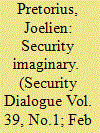| Srl | Item |
| 1 |
ID:
080873


|
|
|
|
|
| Publication |
2008.
|
| Summary/Abstract |
This article proposes the notion of a security imaginary as a heuristic tool for exploring military isomorphism (the phenomenon that weapons and military strategies begin to look the same across the world) at a time when the US model of defence transformation is being adopted by an increasing number of countries. Built on a critical constructivist foundation, the security-imaginary approach is contrasted with rationalist and neo-institutionalist ways of explaining military diffusion and emulation. Merging cultural and constructivist themes, the article offers a `strong cultural' argument to explain why a country would emulate a foreign military model and how this model is constituted in and comes to constitute a society's security imaginary
|
|
|
|
|
|
|
|
|
|
|
|
|
|
|
|
| 2 |
ID:
098849


|
|
|
|
|
| Publication |
2010.
|
| Summary/Abstract |
Despite a rich volume of scholarship on strategic culture and security, scant attention has been paid in such studies to explore the representations of strategic cultures and insecurities in international politics. To address this lacuna, I follow in this article a critical constructivist reading of strategic culture and insecurity, with an eye at examining some of its conceptual, theoretical and analytical premises, which, despite incorporating how various aspects of strategic cultures define security choices, have shared the realist notion of anarchy as given in international politics. In doing so, I offer a critical constructivist analysis highlighting the socially constructed nature of and the mutually constitutive relation between the representations of India's strategic culture, statist identity, insecurities and nuclear policies. Drawing from my case study, I conclude by offering some suggestions along a critical constructivist line to conceptually, theoretically and analytically broaden the existing understandings of strategic cultures and states' security practices.
|
|
|
|
|
|
|
|
|
|
|
|
|
|
|
|